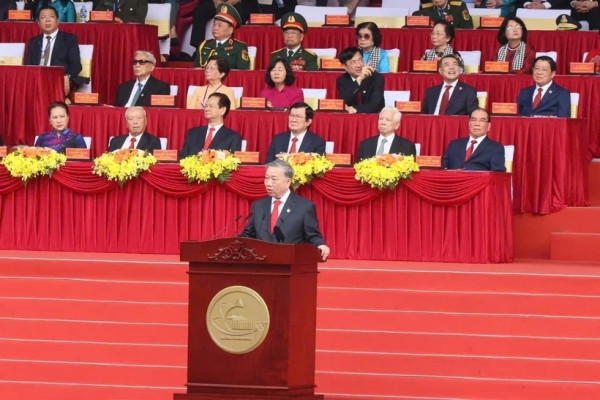Vietnam Marks 50th Anniversary of National Reunification with Solemn Ceremony in Ho Chi Minh City


(KPL) Vietnamese General Secretary of the Central Committee of the Communist Party of Vietnam (CPV) To Lam delivered a powerful and emotional address during a national ceremony commemorating the 50th anniversary of the liberation of the South and national reunification on April 30 in Ho Chi Minh City, Vietnam.
The event marked a pivotal moment in the country's history, honoring the sacrifices of generations and reaffirming the path of independence, socialism, and development.
The event was jointly organized by the CPV Central Committee, the National Assembly, the State President, the Government of the Socialist Republic of Vietnam, and the Vietnam Fatherland Front. It brought together leaders, former leaders, veterans, Heroic Vietnamese Mothers, heroes of the armed forces, youth volunteers, and international guests to reflect on the historical victory of April 30, 1975—a day that marked the end of decades of war and foreign domination and the beginning of national reunification and independence.
Speaking before thousands in the city named after President Ho Chi Minh, General Secretary To Lam emphasized the event’s deep historical, political, and emotional significance. “April 30, 1975, is the most brilliant milestone in the history of building and defending the country. It marked the glorious end of a 30-year resilient struggle for independence and freedom,” he declared.
To Lam paid tribute to the enduring legacy of President Ho Chi Minh, whom he described as “the genius leader of our Party and nation, a great teacher of the Vietnamese revolution,” and whose vision and determination for national reunification inspired generations of fighters. He cited President Ho’s belief that “No matter how difficult or arduous, our people will definitely win. Our Fatherland will definitely be reunified.”
The General Secretary also expressed gratitude to the countless individuals and groups who contributed to the country’s liberation. “We will forever remember and be grateful for the revolutionary leaders, martyrs, armed forces, volunteers, and families with meritorious service,” he said, while also extending sincere appreciation to international allies and peace-loving friends around the world for their unwavering support during the war for national salvation.
To Lam recounted the brutal legacy of foreign interventions, first by French colonialists and later by the US imperialists. He highlighted the scale of destruction and loss during the American war, which included devastating bombings, civilian casualties, and long-lasting consequences that continue to affect the nation. Yet, in the face of overwhelming challenges, the Vietnamese people demonstrated “bravery, resilience, and the iron will” to liberate the South and reunify the country.
“The victory of the resistance war against the US for national salvation is a symbol of revolutionary heroism, a triumph of patriotism, justice, and the spirit of unity,” he noted. He underscored the critical role of the Party’s leadership, the strength of national unity, and the support from socialist allies and international progressive movements.
Recalling the decisive moments of the Ho Chi Minh Campaign and the Great Spring Victory of 1975, he said these historic events “not only liberated the nation but also inspired the global struggle against neo-colonialism and for social progress.”
The General Secretary outlined seven major lessons from the victory, with the foremost being the absolute leadership of the Party. Other lessons included the importance of national unity, strategic vision, military and political acumen, and post-war reconciliation. “The greatest lesson was the leadership of the Party, which must be preserved and continuously strengthened,” he stated.
Looking forward, To Lam highlighted the country’s progress over the past five decades. He pointed out that from a war-torn, impoverished nation, Vietnam has transformed into a rising economy, now ranked 32nd globally and among the top 20 for trade and investment.
The poverty rate has plummeted from over 60% in the 1980s to under 2% today, while the country has become deeply integrated into the global political and economic landscape.
He also emphasized the success of Vietnam’s foreign policy, noting its establishment of diplomatic ties with all 194 UN member states and the expansion of strategic partnerships, including with the United States. “In 2025, we will mark the 30th anniversary of Vietnam-US diplomatic relations—a testament to our policy of reconciliation and cooperation,” he added.
In conclusion, General Secretary To Lam called on the Vietnamese people to uphold the revolutionary spirit of 1975 as they embark on a new phase of national development. “Half a century has passed, and we now stand at a new historical starting point. Let us strive to build a strong, democratic, prosperous, and happy Vietnam, contributing meaningfully to global peace and progress,” he urged.
The 50th anniversary celebration reaffirmed Vietnam’s unwavering commitment to preserving its hard-won peace, advancing national prosperity, and honouring the sacrifices of those who made reunification possible.
